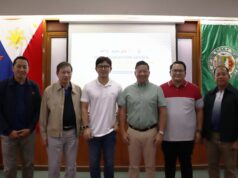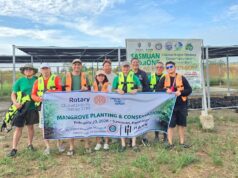“COPS TO limit movement of US troopers arriving for Balikatan.” So screamed Punto!’s banner headline last Tuesday.
Ding Cervantes wrote: “Amid the rising number of killings of foreigners, this city’s police chief said…the movement of some 200 US servicemen expected here for joint RP-US military exercises this April would be limited to their former Clark military base and SM City mall near the freeport’s main gate.”
A sense of déjà vu there. The declaration of Angeles City as “off limits” to American servicemen and their dependents in the wake of the simultaneous assassination of three US troopers and one Filipino mistaken for an American by Group Mazda, the urban partisan unit of the New People’s Army that evolved into the dreaded Mariano Garcia Brigade. This was in October-December 1987.
Rummaged through my files is this report I sent to the Associated Press where I then worked as stringer for Central Luzon. (This is incorporated in my book Brigada.45 published in 2004)
Lights dimmed, business down
in Basetown, Asia
ANGELES CITY (November 10, 1987) – Tonight the garish neon lights flickered then dimmed along infamous Fields Avenue; its varied denizens swallowed by the silent darkness of empty bars, clubs and cocktail lounges.
For the fourth straight night, the flesh district of what has come to be called Basetown, Asia – for hosting Clark Air Base, the largest American military installation outside continental United States – was totally devoid of raucous, raunchy and randy servicemen.
It was the fourth day since the declaration by the 13th US Air Force (USAF) Command of Angeles City as “off-limits” to all its military and civilian personnel and their dependents. The order confined the movement of US citizens within the Clark Air Base perimeter.
“Millions (of pesos) are lost nightly in the absence of Americans,” said Frank Abrillo, president of the Angeles Entertainment Industry Association. “Just think in terms of the unconsumed truckloads of beer and ladies’ drinks and the losses are awesome.”
In accented English, bargirls said there was barely anything left to send to their families in the provinces, much less for their trade essentials of lipstick, make-up and clothes.
“Much as we would like to go to Olongapo, we can’t. There’s barely enough business for our sisters there. They too are hard-up in these times when no American ships dock at Subic,” said Analita Tuyay, a dancer at the DMZ Bar.
Restaurants along the Balibago strip complain of up to 70 percent loss in patronage; motels of mere 10 percent occupancy.
“We cannot survive on purely Filipino clientele,” Meng Kwong of Shanghai De Luxe Restaurant told AP, motioning to an almost empty dining hall. The 24-hour fine-dining eatery is a favorite haunt of US servicemen and their families.
William Tan So, operator of a motel chain here, puns: “We rise and fall on the libido of GI Joe. So he is repressed, so we are depressed.”
Shelves and display cabinets of the stalls at Nepo Mart and Dau Arcade are running out of PX (post exchange) goods as varied as Pringles potato chips and Playboy magazine, Dove soaps and Hanes shirts, combat boots and Jack Daniels, and just about any and every commodity smuggled out of the Clark commissary.
“The demand is even greater now, but what can we do? Clark is our only supplier. We just pray that the off-limits order be lifted soon. In ten days, Christmas shopping starts. What will become of us?” rues Fidel Dayrit, president of the PX Traders Association.
“More than ever, we now feel the ill effects of an artificial economy; one that is totally dependent on Clark,” said Angelo Lopez, former Angeles City economist. “We have neither an agriculture base nor a major industry. Ours is purely service, oriented solely for the Americans in Clark.”
The local chamber of commerce and industry met yesterday with the mayor and the city council to find means to reverse the economic downturn caused by the “off-limits” order.
“There is no way for Angeles City to survive other than having the Americans out of Clark and into the city again. It is as basic as that,” businessman Renato Timbol said.
A joint resolution was passed during the meeting, “assuring the security of American servicemen and their families” and “calling for the immediate lifting of the off-limits order.”
Copies of the resolution were sent to the commander of the 13th USAF and to US Ambassador Nicholas Platt who was also invited for a “come and see” visit to Angeles City by the mayor.
“The business sector shall unite with the city government in initiating security measures that will protect US servicemen and their families,” Mayor Francisco G. Nepomuceno said after the meeting. “As first activity, we will have a demonstration of our love for our American brothers.”
PAST IS present. Down to the name of the mayor. May the junior occupying city hall now emulate his senior. Even only in coming up with a solution to the current killings in the city.
A postscript to the report: On Nov. 27, 1987, the 13th USAF Command lifted the off-limits order after “ample security measures (were) instituted by the Philippine government to protect American lives.”
“Happy days back in Sin City” headlined our Nov. 28 report to AP, reading in part: “Hundreds of Philippine Army soldiers in full battle gear and local policemen toting M-16 rifles have virtually transformed the city into a “garrison state,” to quote a leader of the militant group Bayan.
“The soldiers are posted at the Balibago district and around Fields Avenue. At least two V-150 armored personnel carriers made periodic sweeps of the perimeter road around Clark. Patrol jeeps also make the rounds of off-base housing facilities hosting American servicemen and their families…”
Now, now, Senior Supt. Pierre Bucsit, city police director, don’t get any ideas from there, Sir.
Ding Cervantes wrote: “Amid the rising number of killings of foreigners, this city’s police chief said…the movement of some 200 US servicemen expected here for joint RP-US military exercises this April would be limited to their former Clark military base and SM City mall near the freeport’s main gate.”
A sense of déjà vu there. The declaration of Angeles City as “off limits” to American servicemen and their dependents in the wake of the simultaneous assassination of three US troopers and one Filipino mistaken for an American by Group Mazda, the urban partisan unit of the New People’s Army that evolved into the dreaded Mariano Garcia Brigade. This was in October-December 1987.
Rummaged through my files is this report I sent to the Associated Press where I then worked as stringer for Central Luzon. (This is incorporated in my book Brigada.45 published in 2004)
Lights dimmed, business down
in Basetown, Asia
ANGELES CITY (November 10, 1987) – Tonight the garish neon lights flickered then dimmed along infamous Fields Avenue; its varied denizens swallowed by the silent darkness of empty bars, clubs and cocktail lounges.
For the fourth straight night, the flesh district of what has come to be called Basetown, Asia – for hosting Clark Air Base, the largest American military installation outside continental United States – was totally devoid of raucous, raunchy and randy servicemen.
It was the fourth day since the declaration by the 13th US Air Force (USAF) Command of Angeles City as “off-limits” to all its military and civilian personnel and their dependents. The order confined the movement of US citizens within the Clark Air Base perimeter.
“Millions (of pesos) are lost nightly in the absence of Americans,” said Frank Abrillo, president of the Angeles Entertainment Industry Association. “Just think in terms of the unconsumed truckloads of beer and ladies’ drinks and the losses are awesome.”
In accented English, bargirls said there was barely anything left to send to their families in the provinces, much less for their trade essentials of lipstick, make-up and clothes.
“Much as we would like to go to Olongapo, we can’t. There’s barely enough business for our sisters there. They too are hard-up in these times when no American ships dock at Subic,” said Analita Tuyay, a dancer at the DMZ Bar.
Restaurants along the Balibago strip complain of up to 70 percent loss in patronage; motels of mere 10 percent occupancy.
“We cannot survive on purely Filipino clientele,” Meng Kwong of Shanghai De Luxe Restaurant told AP, motioning to an almost empty dining hall. The 24-hour fine-dining eatery is a favorite haunt of US servicemen and their families.
William Tan So, operator of a motel chain here, puns: “We rise and fall on the libido of GI Joe. So he is repressed, so we are depressed.”
Shelves and display cabinets of the stalls at Nepo Mart and Dau Arcade are running out of PX (post exchange) goods as varied as Pringles potato chips and Playboy magazine, Dove soaps and Hanes shirts, combat boots and Jack Daniels, and just about any and every commodity smuggled out of the Clark commissary.
“The demand is even greater now, but what can we do? Clark is our only supplier. We just pray that the off-limits order be lifted soon. In ten days, Christmas shopping starts. What will become of us?” rues Fidel Dayrit, president of the PX Traders Association.
“More than ever, we now feel the ill effects of an artificial economy; one that is totally dependent on Clark,” said Angelo Lopez, former Angeles City economist. “We have neither an agriculture base nor a major industry. Ours is purely service, oriented solely for the Americans in Clark.”
The local chamber of commerce and industry met yesterday with the mayor and the city council to find means to reverse the economic downturn caused by the “off-limits” order.
“There is no way for Angeles City to survive other than having the Americans out of Clark and into the city again. It is as basic as that,” businessman Renato Timbol said.
A joint resolution was passed during the meeting, “assuring the security of American servicemen and their families” and “calling for the immediate lifting of the off-limits order.”
Copies of the resolution were sent to the commander of the 13th USAF and to US Ambassador Nicholas Platt who was also invited for a “come and see” visit to Angeles City by the mayor.
“The business sector shall unite with the city government in initiating security measures that will protect US servicemen and their families,” Mayor Francisco G. Nepomuceno said after the meeting. “As first activity, we will have a demonstration of our love for our American brothers.”
PAST IS present. Down to the name of the mayor. May the junior occupying city hall now emulate his senior. Even only in coming up with a solution to the current killings in the city.
A postscript to the report: On Nov. 27, 1987, the 13th USAF Command lifted the off-limits order after “ample security measures (were) instituted by the Philippine government to protect American lives.”
“Happy days back in Sin City” headlined our Nov. 28 report to AP, reading in part: “Hundreds of Philippine Army soldiers in full battle gear and local policemen toting M-16 rifles have virtually transformed the city into a “garrison state,” to quote a leader of the militant group Bayan.
“The soldiers are posted at the Balibago district and around Fields Avenue. At least two V-150 armored personnel carriers made periodic sweeps of the perimeter road around Clark. Patrol jeeps also make the rounds of off-base housing facilities hosting American servicemen and their families…”
Now, now, Senior Supt. Pierre Bucsit, city police director, don’t get any ideas from there, Sir.




